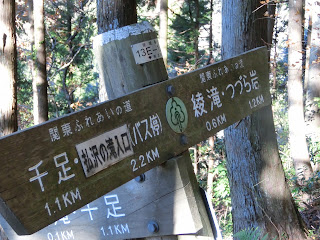Crag name: Tsuzura-iwa
(つづら岩)
Location: Mazukari
ridge (馬頭刈尾根), Okutama
Map sheet: 23
Rock type: Chert
Routes: approx. 15
(from III to VI- and A1)
With an approach walk involving 1h40m map time and about
700m of altitude gain, you’d be forgiven for thinking that Tsuzura-iwa was a
little bit off the radar for a rock-climbing crag… But if you make the effort
to get there, you will not be disappointed!
Situated on top of the Mazukari
ridge, largely above treeline and west facing, this splendid 2-pitch rock face
gets the sun for most of the day, and also provides spectacular views across to
Mt Fuji. The rock is well-featured, the climbing interesting and the location
breathtakingly beautiful. Of course, the protection is the usual rusty Japanese
in-situ ‘leap of faith’, but bolted anchors mid-way and chain anchors at the
top provide peace of mind if needed.
If you are okay with long days finishing in the dark by
headtorch, I would advise walking up to the top of Mt Ōtake afterwards for
sunset.
Summit of Mt Ōtake:
Getting there:
If travelling
from Tokyo (東京)
or Shinjuku (新宿),
take a Chuo Line (中央線)
train bound for Tachikawa (立川),
and then change trains to the Itsukaichi Line (JR五日市線). Get off at Musashi-Itsukaichi (武蔵五日市), the last
station.
From outside the station you can either wait for a bus or
take a taxi. Either way you need to get to Senzoku
(千足)
bus stop. By taxi it will cost you about 3800yen one way.
From Senzoku you need to walk straight up the road into the
mountains for about 20 minutes, until you come to a small car park where the
road ends. The hiking trail starts here.
The trail starts out gently as far as the Tengu waterfall (天狗滝). Continue up to a second pretty waterfall with
a shrine, the Aya waterfall (綾滝).
From here onwards the trail steepens considerably, and for
the next hour or so you’ll be zigzagging upwards until you hit the Mazukari
ridge.
The trail brings you up onto the ridge literally at
Tsuzura-iwa, with a narrow path skirting the base of the rockface.
Getting down from the top:
The top of Tsuzura-iwa is a lovely fin of rock, vertical on
the climbing side, and sloping off the back, with incredible views all around. There
are solid bolt/chain rappel anchors at intervals along the top.
If you have double ropes you should be able to reach the
ground in a single rappel. If climbing on a single rope, you will need to split
your descent at an anchor somewhere in the middle of the face. There is a solid
tree anchor but check the condition of the slings and tat around it and be
prepared to add your own if you don’t trust the in-situ gear.
If you are not looking to abseil, there is a walk-off from
the top. Just head to climber’s right and scramble down the trail.
The routes:
As in previous articles, I will limit the list of routes
here to those that I have personal experience of climbing on lead, but there
are more routes there, and you can find more info in the Japanese guidebook.
1. Okera
route [“オケラルート”,
1 pitch, 35m, III] **
A superb and esoteric route up the left edge of the crag,
with a highly-improbably squeeze up a narrow cleft in the rock.
Pitch 1: Scramble up the first few metres of the gully, then
climb past several rusty pitons until it looks like there is nowhere else to
go. From there, climb up and through the extremely narrow hole, then use your
whole body for friction and upward progress through the enclosed chimney until
you pop out at the top. A few more easy metres brings you to a solid tree to
belay from, or you could continue to the top of the rock on your right to a
chain anchor.
2. Left route [“左ルート”,
2 pitches, 50m, IV] *
Pitch 1: Climb the steep crack leftwards on dubious in-situ
gear, and just keep going up and left until you reach a bolted belay next to a
tree.
Pitch 2: From this belay you could climb up the
right-slanting crack on in-situ pitons at V+, but Left route heads directly
upwards from the anchor for several metres, before face-climbing to the left
for a few metres towards the edge, and then finishing up and right to a chain
anchor. It’s a spectacular finish.
3. Ippan route [“一般ルート”, 2 pitches, 50m, IV] *
Beginning at the right end of the crag, this classic route
takes a line of weakness up and left, covering a large amount of the crag, with
a superb ledge belay, and a steep finish.
Pitch 1: Start with a traverse to the left along an easy
crack, then climb up and continue trending left on good holds. From a sort of
rock pulpit, climb straight up, followed by a traverse out left again to a
broad ledge with trees and a bolted anchor.
Pitch 2: From the ledge, climb a little to the left, then straight
up the face to a crack. Make an interesting move to get established in the
crack, and then finish at a chain anchor directly above.
4. Ippan route variation start [10m, IV+]
A more direct variation to start Ippan route with, taking a
crack straight up at IV+ instead of the initial left traverse.
5. Right route [“右ルート”, 1 pitch, 35m, IV] *
Although deceptively easy-looking from below, this route has
some interest and comes highly recommended. Expect the top half to be very
run-out.
Pitch 1: From the same starting point as Ippan route head
straight up to gain the obvious chimney. Climb the bulge at the top, then
continue up the run-out face to the top. Continue up easy ground to climber’s
left to reach the anchor.
*** Buy the book to support Climb Japan ***

























No comments:
Post a Comment